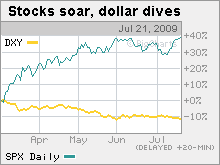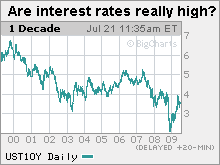Bernanke saves the dollar - for now
The Fed chairman faces the tough challenge of making sure the greenback doesn't continue to weaken. But a much stronger dollar won't help either.

 |
| Green shoots hurt the greenback. Since the market hit bottom in early March, the dollar (DXY) has lost value. (Click the chart to track the dollar against other currencies.) |
 |
| Although long-term bond yields have shot up as the dollar has weakened, rates are still relatively low by historical mesaures. (Click the chart for more bond rates.) |
NEW YORK (CNNMoney.com) -- Federal Reserve chairman Ben Bernanke has a major problem on his hands. He is doing his best to try and save the economy from slipping further into recession. But he may have to sacrifice the U.S. dollar in the process.
Bernanke appeared in front of the House Financial Services Committee Tuesday as part of his semi-annual testimony to Congress about the state of the economy.
Once again, Bernanke defended the Fed's unconventional methods for trying to stimulate lending activity, but some financial experts still wonder if the Fed has gone too far.
There are concerns that the Fed essentially has a blank check and that printing money to repair the financial system will ultimately lead to a substantially devalued dollar and more inflation.
The dollar rallied earlier this year due to the notion that it was a safe haven currency. And it did inch slightly higher Tuesday morning as traders digested Bernanke's editorial in The Wall Street Journal. In the piece, Bernanke outlined the ways the Fed could unwind its various lending programs. He didn't offer a timeline for when the central bank might do so, however.
Even so, the dollar has lost about 12% against the euro as well as a broader basket of global currencies since the stock market hit its lowest point of the year in early March.
Fortunately, it's premature to declare that the dollar has turned anemic just yet. The dollar remains about 11% above its all-time low against the euro set last summer -- a period when oil and gas prices were skyrocketing to all-time highs.
Talkback: Are you worried that the dollar will weaken further and spark a wave of inflation? Leave your comments at the bottom of this story.
Some think that there is little Bernanke can do to affect the currency markets. As such, it's better for the Fed to focus on ways to stimulate the economy and not worry too much about how a weaker dollar could fuel longer-term inflation.
"The Fed chairman has to be mindful of the dollar, but it's not his job to support the dollar when it comes to rhetoric," said John Lynch, chief market analyst with Evergreen Investments.
Lynch added that even though long-term bond yields have perked up from their panic-induced lows earlier this year, they are still well below normal ranges -- at about 3.5% versus the average of 7% since World War II. Low rates are a tangible sign that the bond market isn't worried about inflation.
"Inflation fears are misguided. It's just not a phenomenon yet. You still have falling home prices, little wage growth and rising unemployment," Lynch said.
Still, Bernanke has to tread very carefully. If the dollar weakens much further, there is a risk that commodity prices could soar again and make the price of many imported goods more expensive. That could be yet another unwanted strain on an already tapped out American consumer.
"Bernanke has to walk a fine line right now. He has to weigh the possibility of the downside risks to the U.S..economy," said Kathy Lien, director of currency research at GFT, a foreign exchange and futures brokerage firm in New York. "Even though the global economy is recovering, it's most likely going to be a recovery that nobody feels. There are still a lot of problems with consumer spending."
Bernanke also can't sound too bullish about the economy's chances of pulling out of the recession since talk of "green shoots" has often led to sell-offs in the greenback.
"It is important for Bernanke not to signal another green light for [foreign exchange] traders to sell the US currency as has become the case during each phase of market stabilization," wrote Ashraf Laidi, chief market strategist with CMC Markets, a London-based currency brokerage, in a note to clients Tuesday morning.
And if the dollar weakens further, there could be renewed calls from the so-called BRIC nations (Brazil, Russia, India and China) for a new currency to replace the dollar as the world's reserve currency of choice.
At the same time, a much stronger dollar could create some headaches as well.
Even though dollar rallies have usually led to pullbacks in the price of oil and a drop in long-term bond rates -- which both help to quash inflation fears -- the stock market has also tended to dip during dollar rallies as well. That appears to be a byproduct of renewed skepticism about the timing and depth of an economic recovery.
In addition, big multinational companies, which are helping to fuel the recent rally thanks to better-than-expected profits, may wind up experiencing hits to their earnings and sales if the dollar strengthens.
A weaker greenback tends to lead to better results for large companies since sales and profits from overseas get a boost once translated back to dollars. The reverse is true when the dollar is stronger.
Big pharmaceutical company Merck (MRK, Fortune 500) and business software developer Sybase (SY), for example, both reported Tuesday morning that their sales declined in the second quarter because of a stronger dollar earlier in the period. Excluding currency fluctuations, their revenues would have increased.
"Bernanke has been basking in dollar weakness. All administrations pay lip service to a strong dollar but what we need is a slightly weaker dollar," Lien said. "If the dollar strengthened significantly that could hurt the chances of a recovery."
So it's not going to be easy for Bernanke. He needs to make sure his comments don't swing the dollar too much in either direction. He has to try and talk the dollar into that proverbial Goldilocks zone. It can't be too strong or too weak. It has to be just right.
Talkback: Are you worried that the dollar will weaken further and spark a wave of inflation? ![]()


